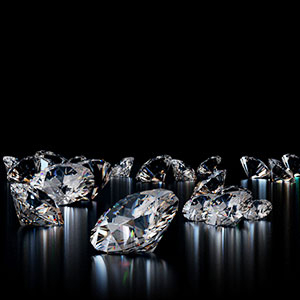
Starting next September, any diamond over half a carat imported into a G7 country—including the United States—could be required to have its provenance certified on a multinational ledger, according to a questions-and-answers page on the European Commission (EC) website.
The Q&A was posted following the announcement of new G7 sanctions on Russian diamonds, and it addresses some key topics—namely what kind of “traceability system” the G7 may require and when.
As laid out, the new rules could present a substantial—and possibly disruptive—change in how the industry operates. For the moment, they seem to apply only to the European Union, not the wider G7. Four industry officials working on this issue believe it’s possible that the United States, which has yet to release an executive order on sanctions, may impose different rules. That said, the EC has repeatedly referenced the G7 in communications about sanctions, and an EC source says the G7 “agreed and worked together on this road map.”
The Q&A says that starting in March 2024—when the ban on diamonds mined in Russia but polished elsewhere officially begins—G7 member states will “establish a robust traceability-based verification and certification mechanism.”
From March to September, “economic operators can choose to use either the traceability-based certification and certification mechanism or other evidence proving the non-Russian origin” when they import polished diamonds that weigh one carat or more.
But as of Sept. 1 next year, “the use of the traceability-based certification and certification mechanism will be mandatory,” and the requirement will apply to diamonds 0.5 cts. and larger, as well as diamonds set in watches and jewelry (with the same half-carat cutoff). Sept. 1 will also bring regulations on the importation of lab-grown diamonds, though provenance requirements haven’t been decided yet, says the EC source.
“The traceability system includes a mandatory registration, using so-called ‘digital twins’ of the real diamond in its rough state and issuing a certificate of its origin,” according to the EC web page. “The identifying information and certificate will be entered in blockchain-based ledger. This allows the diamond to be traced through the production process and can be presented at the time of importation of the finished diamond.”
Under the envisioned system, importers would be allowed to use a wide array of approved industry traceability platforms. The data from those platforms will be recorded on a multinational ledger, similar to the SWIFT international banking exchange, which will likely be overseen by the G7 or a member country.
Registering diamonds “would normally be done as close as possible to the time of exportation from country of origin or at the mine,” says the EC source. When that’s not possible, the Antwerp Diamond Office will issue the certificates. Depending on the requirements, that could mean a majority of the diamonds will have to be routed through Belgium.
Industry sources were surprised that the EC communication did not mention recycled goods or goods held in stock, which could prove a problem as they have no certifications.
The new rules also ban the importation of “so-called mixed packages of rough diamonds from several origins” into EU nations, if the importers don’t have proof the packages contain no Russian diamonds.
In the online Q&A, the EC pitched the new regulations as a plus for the industry: “This strengthened approach will provide certainty to our citizens and consumers that they are not purchasing Russian diamonds. It will also deliver stronger transparency to producers, including in countries with artisanal production. This will positively impact both earnings from diamonds and producers’ story and brand throughout the supply chain.”
It also notes that direct imports of Russian diamonds into the European Union decreased more than 80% during the period of July 2022 through April 2023, compared with July–April in 2021–2022. Figures for 2023 show a 90% reduction, according to the EC.
(Photo: Getty Images)
- Subscribe to the JCK News Daily
- Subscribe to the JCK Special Report
- Follow JCK on Instagram: @jckmagazine
- Follow JCK on X: @jckmagazine
- Follow JCK on Facebook: @jckmagazine






